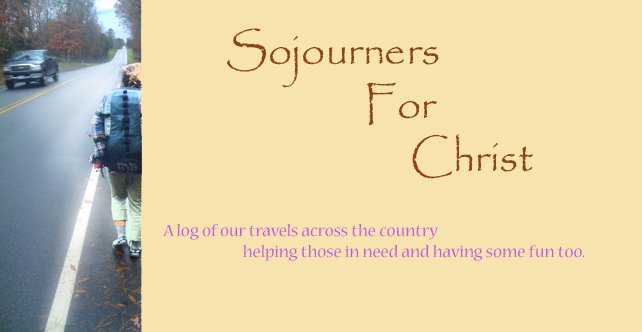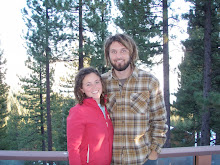Where to begin? Jess and I have had an amazing last couple of weeks. We left Mississippi on May 29th and Ray took us up to his property where we helped him plant some azaleas. My Aunt Theresa picked us up and we went to her house near Richmond, Virginia. After spending a wonderful week there with my Aunt, Uncle and cousins they took us to Nazareth Farm in West Virginia. (www.nazarethfarm.org)
Our week at Nazareth Farm was filled with joy, tears, challenges and most of all love. Nazareth Farm focuses on four cornerstones: Prayer, Community, Service, Simplicity. All four of those cornerstones are evident and fit together perfectly to create a week long experience of the love of Christ for the volunteers who come for a service retreat.
Upon arrival Jess and I were greeted with hugs (as are the volunteers). At Nazareth Farm hand shakes don't exist and starting from the very moment people meet they are drawn closer to each others hearts with a giant hug. A life of simplicity is encouraged at the farm. Water is used conscientiously in solidarity with those around the world who are unable to access fresh water. Five gallon bucket showers are encouraged (3 or less a week) and outhouses are found all across the farm in order to limit use of the precious resource. Food is grown in four gardens, which are kept up by the Staff and Volunteers. Every day the community gathers for reflection prayer in the morning and at night; as well as praying before breakfast and dinner when we eat together in a community dining area. Everyone at the farm is asked to take only what they can eat and eat what they take. Most waste is composted or recycled (even plastic sandwich bags are washed and reused).
Each day volunteers are lead on a home repair project by a staff member. Once again Christ and community are on our mind as prayer is said with our work crew and home-owners (which they call "good friends") before work and once again after the work day is complete. The work site becomes more than a work site by the fact that we get to visit, eat lunch and just chit-chat with the homeowners; focusing on building a relationship with that person.
The total experience at Nazareth Farm is hard to explain in words but what it brings to mind is the verse above. No one at Nazareth Farm owns anything (except for maybe their clothes). There are no electronics and the focus is on God and community. By the end of the week all of us were able to share our joys, sorrows, strengths and weakness'. Most importantly we all became like brothers and sisters. There is not a need at the farm, for we discover that our only needs are food, clothing, and shelter. All other things try to fill a hunger which could only be truly satisfied by community and Christ. I believe this is what the early apostles realized as well. They took care of the needs of every person and dropped all "luxuries" because they were satisfied with living in the true sense. Breaking bread with one another in their houses and sharing the joy of Christ in their life.
In this simplicity a true form of love is found. After spending a week at Nazareth Farm it was time for us to head on to our new destination (St. Louis then Nebraska). One of the staff members was heading to Louisville so he offered us a ride. He dropped us off outside the town and we waited for another ride. We were picked up by a husband and wife named Janice and Rick. They invited us into their homes as it was getting close to dark and they lived in the city of Louisville. They made us dinner and offered us cheesecake and showers before we went to bed. They too were Christians. Their daughter was visiting and she was very involved with the youth group at her church. Her name was Amanda and she was 22. They don't normally pick up hitch hikers but said they felt moved to do so coming home from church that night. The next day Amanda invited us to attend church with her and some friends. We went and had a good time and after church we enjoyed lunch with her, her friends and other church members. We didn't end up leaving until around 5:30 that night and the couple took us outside Louisville. They gave us fresh cookies and apples for our journey. Not five minutes went by and a man named "chicken" picked us up on his way to St Louis where he drove a tugboat. He brought us along with us and we arrived around eleven that night and our friend Lance who we knew from AmeriCorps picked us up with his dad. We have been spending the last couple of days with him and will be leaving tomorrow.
This most recent trip leaving Mississippi, spending a week with family, Nazareth Farm and our travels to St Louis have reminded Jess and I how loved we actually are by God and we have been able to experience his love through our relations and kindness of his people. People we have met have touched our lives by their generosity and hospitality and we hope we have encouraged others of the possibilities of those who have Christ as their foundation.
We ask you all to pray for Janice, Rick and Amanda that God may bless their household for the hospitality they showed us and also for the high school volunteers at Nazareth Farm that they may take their experience home with them and continue to live in the light.
Below I have a writing on Simplicity. Author is unknown.
Peace and Love
Jordan and Jess
Simplicity of Life
There is a form of material poverty which is blessed.
“Ah, yes; we were poor, but happy.”
Saint Francis fell in love with it.
In its more striking forms, it may look like a spare and bare existence. But this is not a material deprivation which dehumanizes. It humanizes us.
Simplicity of life is concerned with our relationship to things. But the heart of its meaning is the relatedness of persons. It is positive and blessed because it is grounded in the right order of valuing persons over objects.
Things are good. They are better and best when they are for persons, personal existence, personal celebration.
Life is for people: hence, simplicity.
We travel light enough so that the goods of the earth may be enjoyed and celebrated by all, so that they may bring the glory to God. We travel light enough so that we ourselves may be for persons, rather than expend our lives collecting, maintaining and replacing objects.
In simplicity, we are empowered to see the destitute, to share of our abundance, to ease the dehumanizing poverty that cries out to us. It enables us to give freely, to be more equitable. It frees us to engage the injustices of the world which are often the source of personal degradation. It makes us less fearful to put our security at risk.
In simplicity, we are given time to enter the grace of our human poverty. If we do not surround and suffocate ourselves with things, by which we manage and control our lives, we are far less likely to believe in the illusion that we have no need of God. We would less likely pretend that we are “self-made” men and women. Simplicity, as a liberation from the chains of consumerism, is also a call to prayer, wherein we encounter our spiritual poverty before God and discover the joy of recognizing ourselves as loved and forgiven creatures. Simplicity, moreover, gives us time for each other, for relationships and intimacy and friendship. A simple change in our style of working, consuming, or spending time with television profoundly affects our availability for persons.
Simplicity is as related to love as it is to justice.
It is freedom from compulsive addictions and entrenched escape mechanisms.
It is liberty to see ourselves anew and to disengage from the comforts that blind us to the face of the poor.
It unfetters us, that we might play and savor the moment, that we might give thanks and sing appreciation.
It can unlock us, finally, that we might do bold things, that we might more fully be men and women, not for things, but for others.


you're welcome for the writing...i'm trying to find out the author for you :)
ReplyDeleteThe selection is taken from Faces of Poverty Faces of Christ by John Kavanaugh, S.J. Apparently he also wrote Following Christ in a Consumer Society which you might be interested in as well.
ReplyDelete